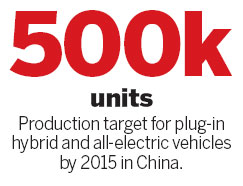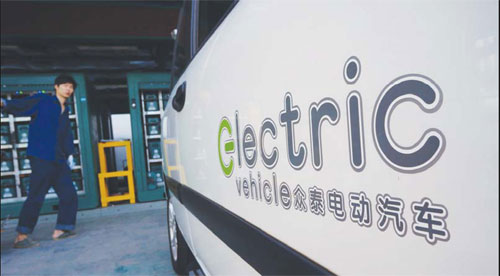Despite ambitions, growing gap in battery-powered cars
Updated: 2012-07-17 10:53
By Han Tianyang (China Daily)
|
|||||||||||
|
Electric car waits for a charge in Hangzhou. While China's industry is strong in batteries, it lags in other electric technologies. Long Wei / For China Daily |
China has made progress in electric vehicles, but compared with some developed countries, the gap in core technologies and industrialization is actually widening, according to a recent report.
Battery-electric vehicles are a mandated priority in China's new energy vehicle R&D, but domestic carmakers still lag behind their foreign counterparts in vehicle reliability and engineering, said the yearly report on the nation's auto industry jointly formulated by the Development Research Center of the State Council, the Society of Automotive Engineers of China and Volkswagen Group China.
The report said that the performance of single-power batteries made in China is close to the international advanced level, but the country trails far behind in battery pack engineering and management.
In addition, China lacks popular mass-produced electric products like General Motors' Volt and the Nissan Leaf, another indication of the widening gap, the report said.
The most well known electric carmaker in China is BYD, a Shenzhen-based company that also makes batteries for cell phones and laptops. Its e6 electric is used in taxi services in the southern city.
The company backed by billionaire Warren Buffett has plans to sell its electric vehicles in the US.
It also operates a joint venture with German's Daimler AG that is developing electric vehicles under the independent brand Denza.
But a recent traffic accident that left an e6 electric taxi incinerated has triggered concerns over the safety of the product and the new technology. The local government has not yet released results of its investigation into the incident,
Feng Fei, head of the industrial economy research department at the DRC, said that though the recent report shows that the gap is widening between China's electric vehicle development and world leaders in the sector, it doesn't mean that the trend will continue.
"China is now in the process of making preparations," he said. "With strong support from both central and local governments, the development of new energy vehicles in the country is likely to accelerate in the next few years."
On the same day the joint report on the nation's electric vehicles was released, the State Council announced a target for both production and sales of 500,000 plug-in hybrid and all-electric vehicles by 2015, with the number projected to reach 5 million by 2020.
Su Bo, vice-minister of Industry and Information Technology, said that the goal is challenging since it's only three and half years until the end of 2015, but an ambitious target could stimulate the industry.
Feng from the RDC noted that the challenges of electric vehicle are common across the globe - immature technology, high prices and a lack of charging infrastructure. He called for alliance between car companies to make significant breakthroughs.

Zhang Suixin, executive vice-president of Volkswagen Group China, agreed that cooperation between countries, governments and companies is crucial to mass production and broad use of electric vehicles.
Zhang said that Volkswagen will launch several electric models next year globally and later introduce them to China.
"We are not simply bringing the technology to China," he said, noting that the company is working with Chinese suppliers for localization.
He said that the first electric vehicle Volkswagen makes in China will certainly use China-made batteries.
hantianyang@chinadaily.com.cn











